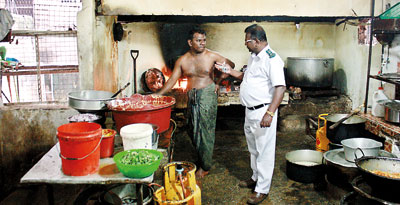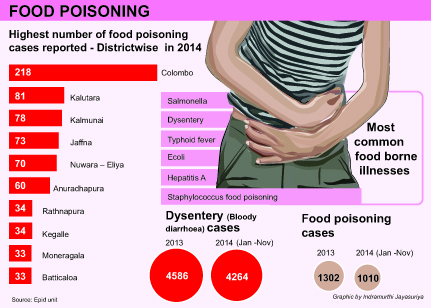News
Eating in Pettah? Think twice
After a walk through an alley barely three feet wide, we ascended a flight of steps strewn with cigarette butts, crumped pieces of newspaper and banana skins.
We are in the heart of Pettah, the country’s commercial world. Here, we watch public health officials of the Colombo Municipal Council (CMC) check one of those ‘eating houses.’ The manager of the place boasts that for the past three decades, the eating house has been feeding staffers of wholesale establishments dealing in onions, potatoes and a variety of other food items.
For some, these are the places that are ‘star class.’ They eat here. The ordinary worker cannot afford Rs. 260 for a chicken or fish meal. So, he patronises the smaller, improvised wooden carts that have rice and curry packets for a modest hundred rupees or less. Even if the curries that go into them are partially rotten potatoes, onions or vegetables it does not bother him.

The kitchen of an eating house
The Sunday Times Insight Team saw the CMC Public Health officials being greeted by a group of bare chested workers. They were waiters and helpers getting ready to serve the meals. With sweat pouring down his bare body, the cook was frying chunks of chicken in the kitchen. A female worker had her right hand deep into what appeared to be an onion sambol. Cooked food in open pans lay next to two open waste bins.
This was the second visit by the officials to the eating house on Prince Street. On the first occasion, they had found an unclean refrigerator packed with beef and mutton. Customers said that beef was taboo in the eating house patronised by a large number of Hindus who work in the nearby commercial establishments.
Recently, an angry customer had contacted the Public Health Department alleging that he had sufferred from a diarrhoea after consuming a meal at the restaurant, a health official told the Sunday Times. Following the complaint Colombo Central Public Health Inspector M.B Lal Kumara was sent to the place.
The complaint was filed on December 4 by the customer with Dr. M. Balasuriya, Colombo Deputy Chief Medical Officer of Health. The complaint stated that the customer had ordered chicken but had been served a different meat instead. As a result he had suffered from diarrhoea.
“There were several dustbins that were left open in the kitchen and I was also shown several unclean wash rooms. The dishwashing was all done in a basin that was lying on the floor while the workers were completely oblivious to their personal cleanliness. There were eight of them and they were all shirtless at the time, Mr. Lal Kumara explained.
“I checked their stores and found that meat was stored under unhygienic conditions. The freezers used to store meat were filthy; it seemed as if the restaurant had not been cleaned out for weeks,” he said.
A case has been fined (case number 41782/14) at the Maligakanda Magistrate’s Court, against the owner alleging that the kitchen was unhygienic and that the preparation and storage methods used by these workers were also unsatisfactory, Mr. Lal Kumara added.
The Colombo City has approximately 1,380 eating places. This includes 479 cafes and 151 restaurants and hotels – including five star hotels – registered with the CMC. There are also another 350 cafes and restaurants and about 2,000 street hawkers in Colombo who are not registered. The city has 200 snack bars and 200 canteens located in schools and universities.
The duties of the 47 Public Health Inspectors (PHIs), six doctors and three food inspectors are to conduct regular inspections, periodically sample food items, check licences and train food handlers.
One of the main problems faced by the CMC’s Public HealthDepartment is that it does not have any powers to seal unhygienic restaurants.
“The powers granted to us under the Food Act of 1981 only allow us to file a case in court. Once a case is filed it will only be taken up in court after a couple of months. These restaurants continue to operate under the unhygienic conditions during this time, Colombo’s Chief Medical Officer Ruwan Wijeyamuni said.
Dr. Subash Mendis, Colombo District 2A Medical Officer of Health told the Sunday Times that the CMC’s PHIs and officers of the Sri Lanka Food Processors’ Association inspected several eateries operating at Olcott Mawatha, Kochchikade, Gas Works Street, Sea Street and in the Colombo Fort area.
Their owners were summoned to the CMC, where they were strongly advised to upgrade their facilities. These hoteliers were given one month’s notice and were told that if they did not adhere to the rules the eateries would be closed.
“A lot of these eateries did improve their standards and encouraged by this, the CMC turned its focus on the vegetarian restaurants operating within the Colombo Fort area. “Around 60 vegetarian eateries were raided and their owners were summoned and given similar notice. The hoteliers were given time up until December 31 this year,” Dr. Mendis said.
Apart from the hygiene standards of the restaurants another serious problem is rotten vegetables founc in the market.
In the past six months, a team of health officials raided several warehouses on 4th Cross Street, 5th Cross Street and Old Moor Street in Pettah. 60 tons of rotten potatoes and 40 tons of rotten big onions were destroyed in the process, a senior health official said.
“Several eating houses and university canteens provide cheap food. The food is so cheap, because the vegetables they buy are cheap. On a regular basis we raid places selling these items, but even so we are unable to completely stop these practices,” he said.Feeling nauseous or vomiting, stomach cramps, watery diarrhoea and fever, within hours of eating a contaminated meal, are signs of food poisoning, Health Ministry Chief Epidemiologist Paba Palihawadena said.
Food poisoning can result from eating food contaminated with bacteria, viruses, toxins or parasites. Severe symptoms of food poisoning include frequent vomiting, vomiting of blood and/or diarrhoea lasting for more than three days, high fever, dehydration, blurred vision, weakness, etc.
Colombo has recorded the highest number of food poisoning cases while Jaffna has the highest number of dysentery cases. Jaffna also has the  highest number of typhoid cases.
highest number of typhoid cases.
Apart from Colombo and Jaffna, Batticaloa, Nuwara Eliya, Anuradhapura and Ratnapura have a high number of cases of food-borne diseases. “These are only the recorded cases; most of the food poisoning cases are isolated ones and are not reported to hospitals. Only the outbreaks or severe ones are recorded,” she said.
Flies in a kitchen, washing dishes and vegetables in the same pot of water or a person suffering from untreated-eczema helping in the kitchen also causes food poisoning.
“Hand washing among food handlers is essential, health check ups should be made mandatory and this has to be continuously monitored to ensure those who had typhoid have received full treatment and are safe to handle food,” she said.
The Health Ministry’s Food Administration Unit Deputy Director K. Tilakaratne said that as most of the food handling work is done by day-wage earners and temporary workers, health authorities are struggling to get them registered.
He said that under the Food Act, food handlers should undergo a medical test at least twice a year and the medical report should be certified by the area’s Medical Officer of Health (MOH).
“Due to the shortage of staff, eatery owners get people on temporary basis not bothered about their health condition and there have been reports of workers employed in eateries without having fully recovered from typhoid,” he said.
He said the public should complain against Public Health Inspectors involved in malpractices.
S. Nagiah, Consultant on Food Control and Administration at the Health Ministry said that new hygienic food handling regulations have been introduced under the Food Act. However there is a shortage of experts to train eatery owners and food handlers.
“Plans are ahead to establish an Institute of Food Hygiene and Administration. Once trained, the workers will be aware of the best hygiene practices. Meanwhile, continuous training is needed for public health inspectors as well,” said Mr. Nagiah, who is the former Chief Food and Drugs Inspector of the Health Ministry and presently trains PHIs.
Training programmes for hotel workers and owners on food safety rules were under way with special programmes for Public Health Inspectors and MOHs on new trends in food technology to improve food quality in all food outlets.
“When there is obstruction of PHIs in pursuit of their duties or if they feel there is a threat police help is sought,” Police Spokesman Senior Superintendent of Police (SSP) Ajith Rohana said.
| Complaint of food poisoning at 5 star hotel The Colombo Municipal Council (CMC) recently received a complaint of a food poisoning case from a five star hotel in Colombo. The hotel had obtained a quotation for the CMC for the testing, but later the hotel was informed by the area MOH office that the test was not necessary. The Sunday Times however contacted the hotel but the executive chef said that the food had not agreed with a couple who had dined at the hotel but after checking the food it was found there was nothing wrong with it. He said therefore the hotel gets the tests done by a private company. CMC outsourcing medical checks Hoteliers alleged that the CMC was outsourcing medical checks on food, beverages and staff to a private medical laboratory that is allegedly owned by a relative of a senior government official in the Western Province. According to a hotel official, until recently these medical checks and the testing of food and water was done by the CMC laboratory for a reasonable rate. However in the past five months the CMC has outsourced this job to a company operating under the name of ‘First International Medical Clinic (Pvt) Ltd. The Sunday Times learns that the CMC laboratory comprise a group of workers with 20 to 25 years experience, whereas the private laboratory consist of workers with only one to two years experience. Institutions such as Sri Lanka Standards Institution (SLSI) send their samples to the 102-year-old CMC laboratory for inspection. A source from the CMC revealed that as a result of this change the council has lost over ten million rupees. “Previously the laboratory used to gain an income from the testing but now this is lost. The laboratory is fully upgraded and comprises a highly trained workforce, but it is yet to receive an accreditation by the Health Ministry,” the source said. He said a private laboratory is not gazetted to perform this sort of testing and inspection. It is only the Municipal Council laboratory that is authorised to do so. It is the primary duty of the Council to ensure the checks are carried out by qualified staff, he said. |

